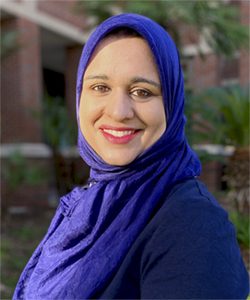“Who is my advisor?”
Department Academic Advisors
First-Year (non-transfer) Students
Herbert Wertheim College of Engineering advisors are available to help you plan your academic program of study, explore majors, and develop your career goals. The Engineering Advising Center (EAC) advises all first-year (non-transfer) engineering students.
Sophomores, Juniors, Seniors, Transfers, and Graduate Students
Booking an Academic Advisor Appointment
Email us at advising@mse.ufl.edu, call 352-846-3312, or schedule an appointment at the below links:
UF Bookings for Academic Advisement – Allyson Beatty
UF Bookings for Academic Advisement – Tahara Franklin
Walk-In Advising Hours in Rhines 108:
Monday & Tuesday, 11 a.m. to 12 p.m. (ET)
Wednesday & Thursday, 2 to 3 p.m. (ET)
Department Academic Coordinators
NE Undergraduate Coordinator

Ph.D., 2009, University of Wisconsin-Madison
Research Interests: Two-phase flow, nuclear reactor thermal hydraulics, quantitative visualization, nuclear reactor safety, computational and numerical methods including coupled codes, advanced nuclear power systems
email: NE Undergraduate Coordinator
MSE Graduate Coordinator

Education: Ph.D., 1987, University of California-Berkeley
Research Interests: Electronic materials, semiconductor processing and characterization, ion implantation, transmission electron microscopy.
Lab Website: Swamp Group
Impact of Materials on Society (IMOS) is on Instagram!
Dr. Kevin S. Jones is a Distinguished Professor and holds the Fredrick N Rhines Chair in the Department of Materials Science and Engineering (MSE) at UF.…
email: MSE Graduate Coordinator
NE Graduate Coordinator

Education: Ph. D., 2005, University of Wisconsin-Madison
Research Interests: structural and fuel materials for nuclear energy systems; LWRs sustainability and aging management; advanced fabrication and joining technologies; used fuel dry storage and disposition.
Lab Website: Nuclear Materials Degradation Research Group (NuMad)
email: NE Graduate Coordinator
Degree Programs
Graduation
Guidance for Ph.D. Dissertation Defense:
It is the student’s responsibility to be aware of deadline dates set by the Graduate School.
- Apply for your degree by completing a degree application on One.UF. This must be done before the deadline posted by UF each term (see UF Registrar’s Office website).
- Submit a transmittal letter to the academic services office at least three days before the first submission deadline.
- Submit the oral examination announcement form to the academic services office at least two weeks before your defense date.
- On your defense date, the entire supervisory committee must attend and examine; two internal MSE members may be substituted if necessary. The chair and external member may not be substituted.
- Refer to the ETD website for information on submission and current deadline dates.
- Register for at least three EMA/ENU 7980 credits in the final term for fall/spring graduation (two credits of EMA/ENU 7980 for summer). If on appointment or fellowship, students must register according to their funding requirements in their final term.
- Comply with Graduate School rules, thesis/dissertation, and final examination deadlines.
Computer Requirements
Guidance for the Internship Process
Undergraduate Students:
Make sure you submit a Request for Internship form with an attached letter of offer prior to the drop/add deadline. We will not issue retroactive internship grades.
You will be given the appropriate section number for which to register.
Once you are nearing the completion of your internship, make sure that you submit a Student Work Report and that your supervisor submits an Employer’s Student Evaluation Form. Both forms are needed for grades to be submitted.
Graduate Students:
The Department recognizes that internships can be an important part of the education of many graduate students and strongly supports these valuable educational experiences.
All MSE graduate students who are interested in pursuing an internship should notify ASO as soon as it becomes a serious possibility and MUST submit the Request for Internship Form to advisingforms@mse.ufl.edu by the following deadlines:
- Fall Internship – July 16th
- Spring Internship – December 1st
- Summer Internship – April 16th
It’s important for students who hold appointments at UF to be cognizant of the start and end dates of their appointments while making internship plans. Graduate students are appointed to assistantships on a semester-by-semester basis (August 16 – December 31; January 1 to May 15; May 16 to August 15) and only for entire semesters. Students cannot be on an assistantship for only part of a semester. In addition, students are not permitted to be on appointment and be on internship at the same time. This is why ASO must be notified, and the request for internship form must be submitted by the posted deadlines.
Internship start and end dates SHOULD NOT interfere with your appointment’s start and end dates. We strongly advise that when negotiating your internship’s timeframe, you request that your internship dates strictly align with the start and end dates of your appointment. Failure to submit the request for internship form by the required deadlines will make it extremely difficult for the request to be processed in a timely manner, which can cause interruptions in pay and health insurance. More critically, internship requests that aren’t approved before the start of the semester in which the student will go on internship may result in losing assistantship funds for that semester. Please discuss the beginning and ending dates of any potential internship with ASO as soon as possible to prevent difficulties with the processing of assistantships, health insurance, and visas.
For complete details regarding internship requirements for graduate students, please refer to the Graduate Handbooks.
Minor in Materials
Minor in Materials Science and Engineering – the department follows the guidelines of the Graduate School.
Ph.D.
Minor: With the supervisory committee’s approval, the student may choose one or more minor fields. Minor work may be completed in any academic unit outside the major if approved for master’s or doctoral programs listed in this catalog. The collective grade for courses included in a minor must be B (3.00 truncated) or higher.
If one minor is chosen, the supervisory committee member representing the minor suggests 12 to 24 credits of courses numbered 5000 or higher as preparation for a qualifying examination. Part of this credit may have been earned in the master’s program. If two minors are chosen, each must include at least 8 credits. Competence in the minor is demonstrated by written examination by the minor academic unit or by the oral qualifying examination.
Minor coursework at the doctoral level may include courses in more than one academic unit if the objective of the minor is clearly stated and the combination of courses is approved by the Graduate School (this approval is not required for a minor in one academic unit).
M.S.
Minor: Minor work must be in an academic unit other than the major. If a student earns more than one course from an academic unit contributing to the major of another, the student is not eligible to earn a minor from the contributing academic unit. If a minor is chosen, at least 6 credits of work are required in the minor field. Two 6-credit minors may be taken with the major academic unit’s permission. A 3.00 (truncated) GPA is required for minor credit.
B.S.
Students may apply to add an undergraduate minor in Materials Science and Engineering or in Nuclear Engineering.
The requirements for the MSE minor can be found here.
The requirements for the NE minor can be found here.
Prior to completing the Undergraduate Application to Add or Cancel a Minor form, students must first meet with an advisor in the Materials Science & Engineering department to discuss minor requirements and the application process. Please email the Advising Office for more information and to schedule an appointment.



